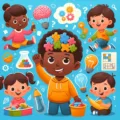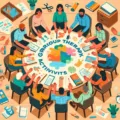Promoting Connections and Kindness
Facilitating a social skills group focused on building healthy relationships can offer rewarding benefits. These groups aim to create an encouraging space for people to practice social interactions, communication skills, and emotional awareness.
Prioritize Understanding and Growth
When planning activities for a social skills group, emphasize personal growth over optimization or metrics. Consider leading energizing games and thoughtful discussions that promote connection and inclusion.
Sample Discussion Topics
- Expressing feelings and identifying emotions in others
- Active listening and asking thoughtful questions
- Respecting diverse perspectives and experiences
- Cooperation and teamwork
- Kindness and compassion
Potential Group Games or Activities
Here are some ideas for activities that could encourage positive social interactions:
- Two Truths and a Lie icebreaker
- Blindfolded communication exercises
- Feelings charades or pictionary
- Cooperative obstacle courses
- Teambuilding games like Human Knot
Measuring Success with Care
When evaluating social skills groups, focus on qualitative outcomes centered on understanding, empathy and emotional growth. Participant feedback can provide insights on what activities were most meaningful to them.
FAQ
What are some icebreaker ideas for a social skills group?
Great icebreakers allow participants to share something about themselves. Examples include Two Truths and a Lie, Desert Island (sharing a few important items to bring), or Unique Talents.
How can you make activities more inclusive?
Offer a variety of activities to appeal to different interests and comfort levels. Encourage participants to modify activities to meet their individual needs.
What if someone struggles to open up in the group?
Make participation optional, emphasize there is no pressure. Have 1-on-1 check-ins if they wish and remind them their comfort comes first.
How do you deal with conflicts in a social skills group?
Validate all perspectives non-judgmentally. Lead discussions exploring the root causes and feelings fueling tensions. Guide participants to find common ground.
Why are social skills groups important?
They allow supportive practice of interpersonal skills essential for life. The connections made can provide friendships, community and reduced isolation.









